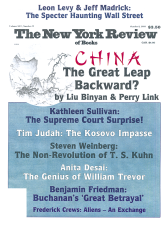In response to:
The 'Tangled Web': An Exchange from the September 24, 1998 issue
To the Editors:
Tony Judt has responded to the main arguments in Henry Kissinger’s comments on my book, A Tangled Web [NYR, September 24], leaving to me questions of a factual nature. I have two examples of liberties Mr. Kissinger has taken with the record, and feel impelled to comment also on his final questioning whether I, an earlier participant in Vietnam policy, should criticize the later actions of others on this front.
In the first category, Kissinger rejects my criticism of the failure to give the Japanese government advance notice before the dramatic announcement of his first trip to Beijing, by stating that I should have known “that there was no way of briefing the Japanese government without a leak.” In fact, as summarized in the text of the book (pp. 239-240), in my State Department years I had several times revealed important forthcoming decisions or developments to the Japanese ambassador, for his prime minister, and there had never been a sign of a leak. Such disclosures were an important part of a relationship of deep trust both ways, which, according to Japanese sources I respect, the Nixon/Kissinger behavior breached in a way still not forgotten.
Next, Kissinger objects to my criticism of the CIA-backed plot to forestall the election of Salvador Allende in Chile in 1970, arguing that while such a project was set in motion it “was never carried out” and was in any event only an “extrapolation” of what earlier administrations had done. To compare covert financial support for the Christian Democratic Party in earlier elections to the 1970 military coup project is bizarre in itself. Moreover, as I again spelled out in the text, while there is a conflict in the evidence whether the original directions to the CIA were countermanded, there is no doubt whatever that key generals had been encouraged to act, and that one of them was responsible for the assassination of the Chief of Staff of the Chilean Army.
As for my standing to criticize the Nixon administration’s conduct of the war in Indochina, my answer can be compressed into a single word: Cambodia. In the quarter of my book devoted to the Indochinese war, I was meticulous in giving neutral accounts, and in some cases favorable comments, on the elements of Nixon’s policy related to withdrawing US forces at a reasonable pace, while in the end applying enough pressure to get the Paris cease-fire agreement of January 1973. Even the Christmas 1972 bombing and the clearly extra-constitutional pledges of all-out bombing if the North again acted offensively were not, in my analysis, the subject of particularly hostile criticism, compared to the comments of many observers then and later.
What Idid indeed strongly criticize was the series of actions concerning Cambodia summarized in the next to last chapter (pp. 498-499), in which, incidentally and contrary to other authors such as William Shawcross, I attribute the key decisions to Nixon rather than Kissinger. In his successive moves to get that unhappy country more involved, in the damage he caused to it by vain military operations, and in his decision finally to go all out in 1973, Nixon took actions in ways that I am far from alone in believing contributed substantially to the rising power and later extremism of the Khmer Rouge. In carrying out these actions Nixon was consciously reversing the policies of the Kennedy and Johnson eras. I see no reason for me to be disqualified from expressing, and supporting by evidence, the judgment that these actions were at best extremely unwise, at worst hard to condone.
William Bundy
Princeton, New Jersey
This Issue
October 8, 1998



